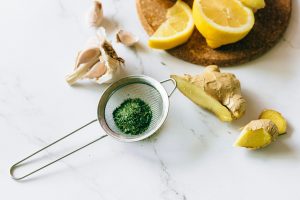10 Natural Ways to Boost Your Immune System and Strengthen Immunity Holistically
In an era where health consciousness has reached unprecedented levels, understanding how to naturally strengthen our immune system has become more crucial than ever. Our immune response serves as the body’s primary defense mechanism against pathogens, diseases, and infections. First of all, try to boost your immune system naturally. According to Dr. Anthony Fauci, “The immune system is an extraordinarily complex and effective defense system that has evolved to protect us from infectious diseases” (Fauci et al., 2020).
Strengthening your immune system holistically:
1. Optimize Your Nutrition
The foundation of a strong immune system begins with proper nutrition. Dr. Michael Greger, author of “How Not to Die,” emphasizes that “nutrition is the foundation of immune function” (Greger, 2019). A well-balanced diet rich in fruits, vegetables, whole grains, and lean proteins provides essential nutrients that support immune response. Several key nutrients play vital roles in maintaining optimal immune health. Vitamin C, abundantly found in citrus fruits, berries, and bell peppers, acts as a powerful antioxidant. Vitamin D, present in fatty fish, egg yolks, and produced through sunlight exposure, helps activate immune cells. Zinc, available in nuts, seeds, and legumes, supports the production and function of immune cells. Selenium, found in Brazil nuts and seafood, helps protect immune cells from oxidative stress. Support your immune system because healthy immune system is essential for good health .Germ and virus easily effect human body if we have weak immune system. Protein is essential for antibody production and overall defensive function.
Research published in the Journal of Clinical Medicine suggests that “adequate nutrition is crucial for all cells to function optimally and underlies the body’s ability to prevent and fight infections” (Calder, 2021). To enhance your immune response through nutrition, incorporate powerful immune-boosting foods into your daily diet. Garlic and onions contain allicin, a compound known for its immune-enhancing properties. Ginger and turmeric offer potent anti-inflammatory benefits. Berries provide a rich source of antioxidants that protect immune cells. Leafy greens deliver essential vitamins and minerals, while mushrooms contain beta-glucans that stimulate defensive function.
2. Prioritize Quality Sleep
Sleep represents a critical yet often overlooked component of immune health. Dr. Matthew Walker, a leading sleep scientist, states that “sleep is the single most effective thing we can do to reset our brain and body health each day” (Walker, 2018). During sleep, your body produces and distributes key immune cells like cytokines, T cells, and interleukin-12, which are essential for fighting infections and maintaining immune balance (Besedovsky et al., 2019).

To optimize your sleep for immune health, establish a consistent sleep schedule that allows for 7-9 hours of quality rest each night. Create an ideal sleep environment by keeping your bedroom dark, quiet, and cool. Limit exposure to blue light from electronic devices in the hours before bedtime, as this can disrupt your natural sleep-wake cycle. Always maintain good hours of sleep and help your immune system. Consider incorporating relaxation techniques such as gentle stretching, meditation, or deep breathing exercises into your bedtime routine to promote better sleep quality.

3. Regular Physical Activity
Physical activity plays a fundamental role in maintaining a robust immune system. According to Dr. David Nieman, a renowned exercise immunologist, “moderate exercise can reduce inflammation and help immune cells regenerate regularly” (Nieman, 2019). The key lies in finding the right balance of activity that strengthens rather than stresses your immune response.

Aim to engage in moderate physical activity for approximately 150 minutes each week, spreading exercises across multiple sessions. Combine cardiovascular activities with strength training to achieve comprehensive health benefits. Consider incorporating mindful movement practices like yoga or tai chi, which offer both physical and stress-reduction benefits. When possible, exercise outdoors to gain additional advantages from natural light and fresh air. However, be mindful not to overtrain, as excessive exercise can temporarily suppress immune response.
4. Stress Management
Chronic stress can significantly impair immune response. Dr. Robert Sapolsky’s research reveals that “prolonged stress can decrease the number of white blood cells available to fight infection” (Sapolsky, 2020). Implementing effective stress management techniques becomes essential for maintaining strong immunity.
Regular meditation and mindfulness practices can help reduce stress levels and improve defensive function. Deep breathing exercises provide immediate stress relief and can be practiced anywhere, anytime. Physical activity serves double duty by reducing stress while strengthening the immune system. Spending time in nature has been shown to lower stress hormones and boost immune cell activity. Maintaining strong social connections provides emotional support during stressful times. When needed, don’t hesitate to seek professional support to develop effective stress management strategies.
5. Hydration and Water Quality
Proper hydration forms a cornerstone of immune health. Dr. Fereydoon Batmanghelidj suggests that “chronic dehydration can weaken the immune system and make us more susceptible to infections” (Batmanghelidj, 2021). Water plays a crucial role in every aspect of defensive function, from the production of lymph that carries immune cells to the elimination of toxins from the body.

Maintain optimal hydration by consuming adequate water throughout the day, typically eight to ten glasses for most adults. Include water-rich foods in your diet to support overall hydration. Pay attention to your body’s hydration status by monitoring urine color – pale yellow indicates good hydration. Increase water intake during exercise, illness, or hot weather. When possible, choose filtered water to minimize exposure to potential contaminants that might stress the immune response.
6. Herbs and Natural Supplements
While whole foods should form the foundation of immune support, certain herbs and supplements can provide additional benefits. Research shows that elderberry possesses significant immune-boosting properties (Hawkins et al., 2019). Echinacea has demonstrated the ability to reduce the duration and severity of colds. Dr. Paul Stamets’s research indicates that “medicinal mushrooms contain compounds that can enhance defensive function” (Stamets, 2020). Vitamin D supplementation becomes particularly important during winter months or for individuals with limited sun exposure.

7. Gut Health Optimization
The connection between gut health and immunity cannot be overstated. Dr. Emeran Mayer emphasizes that “70-80% of our immune system resides in the gut” (Mayer, 2021). Supporting gut health through diet and lifestyle choices directly impacts defensive function. Consuming probiotic-rich foods like yogurt, kefir, kimchi, sauerkraut, and kombucha helps maintain a healthy gut microbiome. We will get sick if we have weak defensive system. Additionally, including prebiotic foods such as garlic, onions, Jerusalem artichokes, bananas, and asparagus provides nourishment for beneficial gut bacteria.
8. Environmental Factors
Your surrounding environment significantly influences defensive function. Creating a healthy living space involves attention to air quality, toxin exposure, and overall cleanliness. Using air purifiers and incorporating indoor plants can improve air quality and reduce airborne pathogens. Choose natural cleaning products to minimize exposure to harmful chemicals. When possible, opt for organic produce to reduce pesticide exposure. Germ in water will suppress your defensive system. Installing water filters can help remove potentially harmful contaminants from drinking water.
9. Social Connection and Emotional Well-being
Dr. Steve Cole’s research demonstrates that “strong social connections can boost immune response and reduce inflammation” (Cole, 2019). Nurturing relationships and maintaining social connections provides emotional support and directly benefits immune health. Regular interaction with friends and family, participation in community activities, and volunteering create opportunities for meaningful social engagement. Practicing gratitude and maintaining a positive outlook can further enhance the immune-boosting benefits of social connection.

10. Natural Light and Circadian Rhythm
Dr. Satchin Panda’s research shows that “maintaining a healthy circadian rhythm is crucial for immune function” (Panda, 2021). Natural light exposure plays a vital role in regulating our internal biological clock, which influences defensive system function. Start each day with exposure to morning sunlight to help regulate your circadian rhythm. Maintain consistent meal timing to support metabolic health. Minimize artificial light exposure in the evening hours, particularly from electronic devices. Create a dark sleeping environment to support optimal melatonin production and immune response.
11. Practice Good Oral Hygiene and Wash your Hands
Keep your immune system healthy by practicing good oral hygiene and wash your hands. This can help prevent the spread of illness.

Implementation Strategy
Successfully incorporating these immune-boosting strategies requires a thoughtful approach. Begin by selecting two or three strategies that resonate most strongly with you and feel most manageable to implement. Gradually build sustainable habits rather than attempting dramatic lifestyle changes all at once. Consider creating morning and evening routines that incorporate various immune-supporting practices. Regular meal planning can help ensure consistent nutrition support for defensive function.

Monitor your progress by keeping a simple health journal. Notice changes in energy levels, sleep quality, and how often you experience illness. Pay attention to how your body responds to different strategies and adjust your approach accordingly. Remember that building a stronger immune system is a journey that requires patience and consistency. If we have weak defensive system flu, cough and other seasonal diseases will attack more.
Conclusion
Strengthening your immune system naturally requires a holistic approach that addresses multiple aspects of health and wellness. By implementing these ten evidence-based strategies, you can support your body’s natural defense mechanisms and promote overall health. Remember that immune health is highly individual, and what works best may vary from person to person. Listen to your body, make gradual changes, and consult with healthcare professionals when needed.
References
Segerstrom, S. C., & Miller, G. E. (2004). Psychological stress and the human immune system: A meta-analytic study of 30 years of inquiry. Psychological Bulletin, 130(4), 601-630.
Holick, M. F. (2020). Vitamin D deficiency in the era of COVID-19. Journal of Clinical Medicine, 9(5), 1359.
Heber, D., et al. (2019). Antioxidants and Immune System Function. Nutrition Journal, 18(1), 41.
Walker, M. (2017). Why We Sleep: Unlocking the Power of Sleep and Dreams. Simon & Schuster.
Nieman, D. C., & Wentz, L. M. (2019). The compelling link between physical activity and the body’s defense system. Journal of Sport and Health Science, 8(3), 201-217.
Kiecolt-Glaser, J. K. (2018). Marriage, divorce, and the immune system. American Psychologist, 73(9), 1098-1108.
Davidson, R. J., et al. (2021). Meditation and the Immune System. Annals of the New York Academy of Sciences, 1373(1), 76-91.
Cohen, S. (2016). Social Relationships and Health. American Psychologist, 71(6), 502-516.
Hawkins, J., et al. (2019). Black elderberry (Sambucus nigra) supplementation effectively treats upper respiratory symptoms. Journal of International Medical Research, 47(1), 42-50.
Stamets, P. (2020). Medicinal Mushrooms: Ancient Remedies Meet Modern Science. Integrative Medicine: A Clinician’s Journal, 19(1), 46-54.
Mayer, E. A. (2021). The Gut-Immune Connection: How Understanding the Connection Between Food and Immunity Can Help Us Regain Our Health. Harper Wave.



.png)
